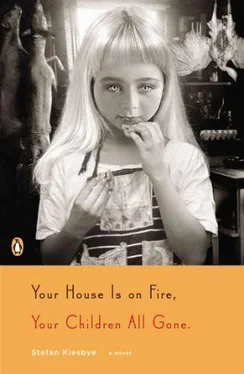“My mother is going to Groß Ostensen the day after tomorrow,” Anke told me. “She wants to buy fabrics. You want to come with us?”
“Yes,” I said immediately, but then thought better of it. “Another time. I have to help my dad.”
Anke rolled her eyes. “Do you have to play with Friedrich again?”
I shrugged. “He doesn’t have anybody else to play with during recess.”
“Serves him right. My mother says he needs a father. But of course that’s not going to happen.” She tapped her forehead. “Where would he get one?”
Only in the late afternoon, after the sun went down, did I return home. My dad was nowhere to be seen, but my mom had visitors. When I stepped into the lighted kitchen, Mrs. Meier, the baker’s wife; Mrs. Schürholz, the Gendarm ’s wife; and the mailman’s wife were sitting around the table. This was no coffee klatch, however. A marble cake stood between them, but my mom hadn’t used the good china; the women drank their coffee from the plain blue-and-white cups.
They fell silent while my mother piled the rest of our Christmas dinner onto my plate and sent me to my room. Once there I closed my door from the outside, but loud enough for the women to notice, then put down my plate and listened to their voices from an armchair in our living room. They sounded very serious and secretive, so I couldn’t overhear much, but I heard the word “crow” several times, and when the women finally said good night, Mrs. Schürholz reassured my mom, “Klaus can get you the forms. We’ll deal with that in the New Year. You’ll see.” And the mailman’s wife said, “My husband can arrange that. He’ll deliver it personally.”
“You should have come to us earlier,” Mrs. Meier said. “No need to be ashamed.”
My dad seemed relieved when the holidays were over. His face smoothed out for the first time in three days, and the closer we got to the manor, the brighter his eyes shone from behind his thick glasses.
But Inge did not join us in the garden; instead Friedrich came running. “She has a fever and is sleeping.” He himself looked all gray.
My dad listened to him and nodded. “That’s fine. Tell her to rest.” Then he paused before asking, “Does she need any medication? Shall I get the doctor for her?” He took a few steps toward the manor house, but then stopped. “Linde,” he instructed me. “You go and see if Mrs. Madelung needs anything.”
“You don’t need to come,” Friedrich said once we were out of earshot. “It’s not a real fever.”
“Not a real fever?”
“Well, she’s sick, but in a different way.” When I looked at him without comprehending, he added, “She hasn’t slept all night. I think she saw my dad.”
“But he’s dead,” I said out loud, and then put my hand quickly over my mouth.
He shrugged. “She really saw him though, I think.” And then Friedrich told me what had happened. His mom had given him a new pair of pants for Christmas, and against her wishes he had worn them to play outside. But after hanging around the stables, he had slipped on a muddy path and torn a big hole in the left knee. He hadn’t dared go home for a long time, and when he finally returned, after dark, Inge struck him repeatedly. But still her rage wouldn’t subside, and she scolded him, called him an ungrateful brat who only caused her pain. She paced her room, up and down, and up and down, and cursed her fate, cursed the death of her husband, cursed Hemmersmoor and old Mr. von Kamphoff. “And your dad as well,” Friedrich added. “She was beside herself, and then she started to cry and got only more furious, until she finally ran outside.”
The night air was damp but hadn’t cooled off. On her way into the gardens, Inge had not once looked over her shoulder, and Friedrich had hurried from bush to bush and followed her at a safe distance. Near the parkway that led to the road to Hemmersmoor, where you could no longer see the lights from the manor house, Inge had stopped. “She was yelling at my father,” Friedrich said. “‘Hermann,’ she was yelling, again and again. And then she said that he was to blame for all her misery. That he had been only a stupid waiter, and that he had left us voluntarily to go to war. He had been nothing more than canon fodder and left us without money or help, and she had had to escape without him.”
His mother had cried loudly and finally she had shouted, “Hermann! Where are you? What have you done to me, Hermann? What were you doing on the battlefield? You couldn’t even shoot properly. How could you be so dumb and die in a foreign country? What is going to happen to me? To your son? Come back, Hermann, come and help me. It’s all your fault. Come and help me!”
Friedrich was too afraid to leave his hiding place. He was afraid for his mother, but he feared her wrath even more. Yet he kept watching her and suddenly became aware of a white figure among the trees along the parkway. It seemed to scurry from tree to tree without ever touching the ground. “Hermann?” Inge asked, and when the white figure approached her, she screamed, “Hermann!” and began to cry. “Forgive me. I didn’t want to wake you. Go back, Hermann, go back to sleep. I will manage on my own. Forgive me, Hermann, I will let you sleep. I won’t cry anymore, Hermann.”
What had happened afterward, Friedrich couldn’t say. “I ran away,” he said quietly and without looking at me. With the tips of his shoes, he was drawing lines into the sand.
“Was it really your dad?” I asked.
He shrugged his shoulders. “I didn’t imagine all this.”
“Maybe it was one of the von Kamphoffs,” I suggested. “Or maybe Johann’s brother, the true heir. Maybe he escaped from the basement.”
“Those are old wives’ tales,” said Friedrich.
“They’re not,” I insisted.
“In any case don’t tell my mother I told you,” he admonished me. “Don’t let on.”
Together we stepped into their room. Mrs. Madelung slept and didn’t awaken when we tiptoed to her bed and made sure that her eyes were closed and that she was breathing regularly. Her cheeks looked all red, and her wrinkles had smoothed out. From time to time she snored a little.
Friedrich pulled me back and cautiously opened a drawer and took out a photograph, which he showed me once we got outside. “It’s the only one we have,” he said, and let me hold it. It showed a man with thinning hair, wearing a dark suit. He had a fine smile and large, dark eyes. The edges and corners of the picture were bent and worn.
“Was he an officer?” I asked.
Friedrich shook his head. He blushed and said, “I lied.”
“How did he die, then?”
“We don’t know,” he said. “And my mother never visited Lithuania. We don’t even know where exactly he died. I can’t remember his face. Only this picture. When I was little, my mother told me a story about him trying to conquer a large city and dying during the attack. But I think she made that up. This morning she said that last night was a sign.”
“Of what?”
“That he keeps watch over us, and that everything will be fine.”
I handed back the picture and promised not to tell anyone about it. That same night, though, when my mother came to my room and wouldn’t stop asking me about the Madelungs, I broke that promise. Friedrich had seen his father’s ghost, I told her; my cheeks were glowing with excitement. My mother listened greedily. She sat close to me, stroking my hair and listening intently. When I had told her everything I knew, her fingers trembled, and as though she was trying to gain control of her feelings, she bit her hand until she was bleeding. “A gift,” she said with a hoarse voice. “What a gift.”
“She thinks it’s a good sign.”
Читать дальше












